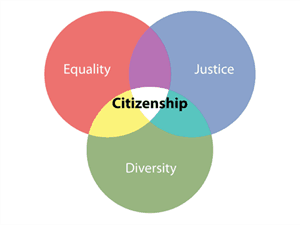Life is not lived without conflict.
While our book club experiment on, “Collaborating with the Enemy” has come to a close, the conversation about collaboration through conflict continues. There’s no question, we are going to disagree. Life is not lived without conflict. Simply having the conversation and participating is what matters most. There are no small roles when it comes to improving our communities. If the book (and our meetings about it) had one stand-out theme it was citizenship.
Rights & Responsibilities, are you exercising these?
So, what is citizenship? One definition is, “the quality of an individual’s response to membership in a community.” According to the US Citizen and Immigration Services, in 2018 over 756,000 people were naturalized. In the last decade that number includes 7.2 million. The department also lists the rights and responsibilities of a U.S. citizen, which include respecting the rights, beliefs and opinions of others and participating in your local community, to name a few. As native U.S. citizens we are born with these rights and responsibilities. Take a moment of reflection and ask yourself, how are you living up to them?
If you haven’t yet read the book Collaborating with the Enemy, here are a few highlights:
- “The fundamentally hierarchical assumption that higher people change lower people, makes everyone defensive: people don’t dislike change, but they dislike being changed.” (p. 28)
- “…We collaborate only when our power is evenly matched and neither of us can impose our will.” (p. 22-23)
- “My thesis was that every person and group possess both of these drives [power/asserting and love/engaging] and that it is always a mistake to employ only one.” (p. 59)
- “Collaborative teams typically make progress not by carefully executing an excellent plan to achieve agreed objectives, but by acting and learning from this acting.” (p. 77)
Many topics discussed in our meetings this month but here are a few take-aways from our last community conversation:
- In a bigger context of society there is a leadership shift movement from the command and control authoritarian style to a grassroots-led approach which requires full community participation to be effective. One example is the 2019 book, Leadershift: 11 Essential Changes Every Leader Must Embrace.
- In practicing good citizenship there is no “us” and “them.” We are all part of the community and all part of the whole.
- Human beings have a natural negative bias in the way we think – it’s a survival mechanism. We have to recognize survival mode in others, practice empathy and listening skills.
- Relationships of any kind are not easy but fully worth the investment as humans are social beings and we need each other.
- Diversity of perspective is critical to creating a better future. All voices matter and make a difference.
So, what now? The diversity and complexity of our society is increasing. In order to create societal wholeness, we must practice the skills of collaborating through conflict and tension.
Participating in Act of Citizenship
There’s no “opt out” button as a citizen.
You can get connected to those responsibilities in a number of ways. WiseTribe offers many ways to strengthen community through interactive problem solving in the areas of food, well-being and learning.
We’ll keep experimenting. We’ll keep asking, inviting and listening. What’s your commitment? Make one today.
We appreciate all who participated in the book club and continue to support the WiseTribe mission. And special thanks to all of our sponsors for your continued support!
